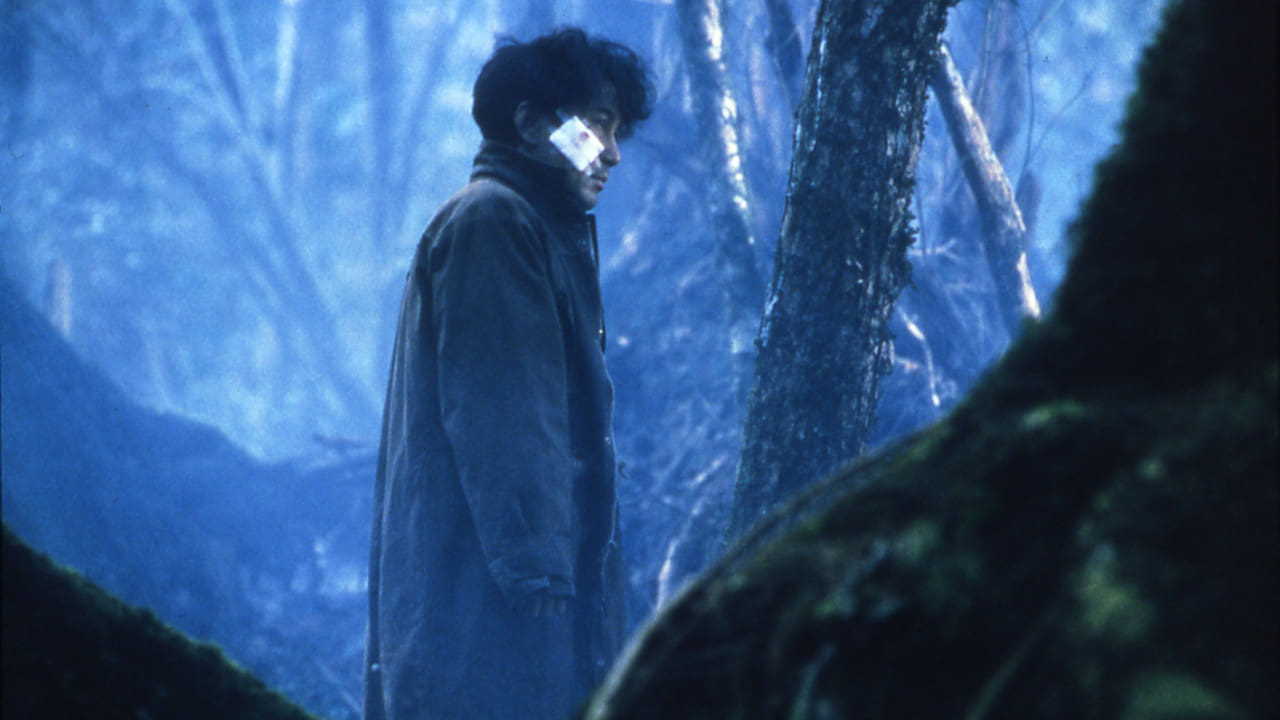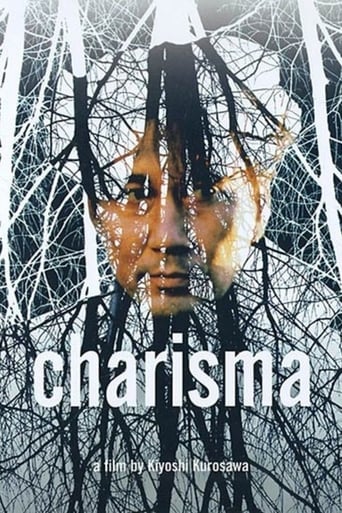

Kiyoshi Kurosawa has had his duds. "Guard from the Underground" (1992) was mediocre at best, "Bright Future" (2003) was pretentious, and "Eyes of the Spider" (1998) was dreadfully boring. The first time I sat down and watched "Charisma" (1999) I had written it off as another Kiyoshi dud, but a future rewatch proved that it's likely his third best film – behind "Cure" (1997) and "Kairo" (2001).The key to enjoying this film is to recognize its two primary themes: individualism and false dichotomies. The value of the individual is contrasted with the needs of society as a whole, and the false dichotomy is the illusion that one must choose between one or the other. Kiyoshi communicates these ideas through symbolism. The tree named Charisma represents the individual human being, while the surrounding ecosystem represents society as a whole. The false dichotomy presents itself when each character is forced to choose between protecting Charisma or the surrounding ecosystem. Without recognizing these symbols, it is impossible for the viewer to appreciate the entertaining content of this film.One of the more interesting characters is the lady botanist. She previously studied individual plants, but claims that she learned nothing from them. She believes that most people are led astray when they look at the individual plants without observing the forest as a whole. This panoramic outlook is fueled when the ecosystem suffers a gradual decline. The botanist claims that the Charisma tree is poisoning the ecosystem and must be destroyed to preserve the surrounding environment. The cop asks her if there's a way for both to survive, but she says that it is impossible. However, it is divulged later on that the botanist herself is accelerating the destruction of the environment by dumping large quantities of poison into a nearby well. Her logic is that a quick death and restoration is a better option than the slow, gradual decline that Charisma is currently inflicting. This must be a very painful decision coming from a character that values the needs of the many over the needs of the few.The tree's guardian takes more of a natural selection angle, that the dominant individual should rightly survive irregardless of the consequences. He needs force to protect the Charisma tree, which is why he wants to persuade the cop to join his side. When the guardian makes reference to the "rules of the forest", the viewer will correctly remember that the kidnapper in the opening scene made reference to "the rules of the world", and since this movie uses the forest as a symbol for the human world, we now understand that both characters share the same essential outlook. You see, the "rules of the world" represent the false dichotomy of choosing between the individual and society. The world maintains order by forcing people to make this decision and blinding them from recognizing that a third option does indeed exist. The guardian seems to subconsciously recognize this third option, but his obsession with Charisma (aka the individual) prevents him from realizing it.This is where Koji Yakusho's character comes into play. He is the "swing vote" of sorts because his status as a policeman gives him the power of authority. However, he seemingly plays both sides, first opting to protect the first Charisma tree and then opting to destroy the second Charisma tree. To confuse matters he also destroys the botanist's poison well. Why does he act so erratically? Because he believes that both Charisma (aka the individual) and the forest (aka society) need to survive. For him the problem is the way the question is posed. Rules and force attempt to establish a false dichotomy that allows for only two wrong choices instead of the correct third option. Therefore, he chooses to help one Charisma and kill another, switching sides to keep the balance between the two forces. This film comes full circle on this theme near the end. The cop redeems his earlier mistake at the beginning of the film (getting both the kidnapper and hostage killed) by saving the botanist near the end without killing the kidnapper, another symbolic representation of avoiding a false dichotomy (of choosing one or another) by saving both.The policeman's refusal to play by the "rules of the forest" causes chaos on a local level, which is first depicted by the sledgehammer killings in the small town and then by the tree guardian's murder of the botanist's assistant. In addition, the men in black (initially hired to retrieve the first Charisma for its apparent monetary value) turn on the local environmentalists and kill them. Even more striking is that these men in black turn down a briefcase full of money and refuse to give the tree guardian a ride (a complete deconstruction of their previous personas that valued money above all else). And since the events within the forest act as a microcosm of the whole world, this local chaos manifests into a worldwide pandemonium. The policeman walks out of the forest to witness the nearby city in flames. His decision to rebel against the rules of the forest has now resulted in the deconstruction of the rules of the world.This is a very well-written movie that is consistent and efficient in its structure. Viewers with an attraction to odd, quirky, deliberately paced art-house films should love this. The environments are also beautiful and moody, and the chilly weather makes this film essential viewing during the late autumn months. A truly great film with more creativity and imagination than a dozen others combined.
... View MoreI think that film deserves a higher average score than it actually has. I guess that the reason is that not too many people understand that this film tells us a symbolic story and all we see must be interpreted in that way. As I far could understand, the main subject of this film is one of the most popular debates in todays Japan: Is individualism winning the match to the sense of society in that Asian nation? That tree, the so-called "Karisuma", the main subject of the film, has to be considered as a symbol of individualism, planted in a forest that was so fertile in the past but now, after Karisuma was planted there, is poisoned and almost dead. The debate is obvious: some characters support Karisuma (the individualism, the triumph of personality), but others support the forest (the impersonal society, as it was considered in traditional Japan) and plan to destroy Karisuma. The final conclusion the main character (Mr. Yabuike) gets to is really wise: he just believes that everybody should let the things be (society can't be avoided) and try to find a place for himself in this world (so individual preferences must be considered too). I insist: wise conclusions for one of the wisest Japanese contemporary films I've seen.
... View MoreKiyoshi Kurosawa is one of the most amazing stylists around. I loved his "Cure" for its distanced, analytical camera work - but I'm no fan of that movie's ending. Then I've seen "Kaïro" and was amazed because it had a completely different style. Scary and finally apocalyptic in a way I've never thought it would go. "Charisma" is the third Kurosawa-movie I've seen and again, its style is amazing. Sometimes the camera watches a scene from far away and gives the action a distanced, neutral look. The shots in the forest are amazing. Sometimes green and lush, sometimes misty and foreboding.But what about that story? I've read many interpretations - that this is an analysis of Japan's society, that this is a neutral (which would fit the style) look at a confrontation of "wrong" and "right". Well, that's all rather intriguing - but no, it doesn't satisfy me at all. Now that I think about it, I'm actually very disappointed by the story. No one in this movie acts rationally which lifts the movie away from reality and lessens its social commentary. It had flashes of brilliance where I clearly saw what Kurosawa was aiming at - but he could not sustain his ideas for the full running time. Sometimes I thought this was a parody and all Kurosawa wants to do in the end is laugh at the viewer who was expecting something that makes sense.That said, I have to admit that it gives you a lot of thought fodder - just not in any rewarding way. Even if it is a clever commentary on Japan's society, that would not be enough for almost 2 hours. So the only really great thing about this film is its visual glory. I'm still not sure whether I like Kurosawa's movies or not. I certainly won't forget them. Rating: 6/10
... View MoreAlthough Charisma was not my favourite movie at the Rotterdam filmfestival, I liked this new movie from Kurosawa Kiyoshi, because of it's neutral message. It shows various sides of the same story without ever judging. It's up to the viewer to decide what he/she gets out of it. At the same it's never really clear what the plot's about. There are some opinions (battle, nature vs man), but i believe there were several. And again, the viewer can pick up what moved him/her watching this film. To me that is a true accomplishment.
... View More